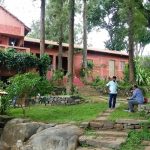About Us
Ashoka Trust for Research in Ecology and the Environment (ATREE) is a globally recognised non-profit organisation focused on environmental conservation and sustainable, socially just development. ATREE engages in the generation and dissemination of rigorous interdisciplinary knowledge that informs and is informed by the needs of grassroots communities, policymakers and the wider public. It prioritises capacity-building for producing the next generation of scholars.
ATREE works across landscapes on issues pertaining to biodiversity conservation and restoration, water security, sustainable resource use, livelihoods and human well-being, and climate change adaptation and mitigation.
Over the past 25 years, ATREE has established itself as a premier institution working on critical challenges and opportunities in environmental conservation and sustainable development. It has been recognised as a Scientific and Industrial Research Organisation by the Ministry of Science and Technology, Government of India, and it is ranked among the top 20 environmental think tanks worldwide (UPenn global ranking).

ATREE established on Jan 11

ATREE sets up the first Community Conservation Centre in Biligiri Rangaswamy Temple Tiger Reserve
Expands to the Eastern Himalayas with a new field station

Hosts the first Association for Tropical Biology and Conservation conference in India
Along with the Institute for Social and Economic Change, sets up the Centre for Interdisciplinary Studies for the Environment and Development

Establishes Lantana Craft Centre in Malai Mahadeshwara Hills
Institutes TN Khoshoo Memorial Award
Sets up India’s first Ecoinformatics Lab

Launches PhD programme

Sets up the Academy for Conservation Science and Sustainability Studies
Receives the prestigious Dr A. P. J. Abdul Kalam Rajya Parisara Prashasthi

Leads the development and launch of the India Biodiversity Portal

Receives recognition from Stanford Social Innovation Review as a globally unique conservation organisation

Centre for Interdisciplinary Studies for the Environment and Development merges with ATREE
Hosts the 5th International Canopy Conference
ATREE honored with the Ryutaro Hashimoto APFED (Asia Pacific Forum for Environment and Development) Gold Award

Ranks #20 out of the top 99 Environment Policy Think Tanks, and continues to hold the ranking for the decade.

ATREE is instrumental in inscribing the Western Ghats as UNESCO’s World Natural Heritage Site

Gets recognized as a Scientific and Industrial Research Organization (SIRO) by the Department of Scientific and Industrial Research, GOI
Hosts the Society for Conservation Biology-Asia Pacific Chapter Conference

Dr Kamal Bawa receives the Midori Prize for Biodiversity at the COP-12

The United Nations Framework Convention on Climate Change (UNFCCC) Secretariat provisionally admits ATREE as an Observer NGO.
Dr Kamal Bawa is honoured with the Distinguished Service Award by the Society for Conservation Biology

Dr Kamal Bawa is honoured with the Linnean Medal in Botany by the Linnean Society of London

Dr Kamal Bawa receives the UNESCO Sultan Qaboos Prize for Environmental Conservation

Ranked #14 among Water Security Think Tanks in the world

Launches masters program in Conservation Practice

An entire new genus of parasitoid wasp dedicated to ATREE

Over 100 species discovered by ATREE

50 PhD students graduated
Dr. Eklabya Sharma receives Prestigious Padma Shri Award for Himalayan Research
ATREE has been selected as one of the 40 world’s most innovative changemakers focused on environmental sustainability at the Stanford Sustainability Summit.
ATREE’s mission is to generate rigorous interdisciplinary knowledge for achieving environmental conservation and sustainable development in a socially just manner, to enable the use of this knowledge by policymakers and society, and to train the next generation of scholars and leaders. To deliver on our mission, we work across issues like biodiversity and conservation, climate change mitigation and development, land and water resources, forests and governance, and ecosystem services and human well-being.
ATREE’s organisational structure is designed to promote creative interdisciplinary approaches that integrate research with policy and action in addressing critical environmental problems. Two research centres, the S M Sehgal Foundation Centre for Biodiversity and Conservation and the Rohini Nilekani Philanthropies – Centre for Environment and Development, together with the Academy of Conservation Science and Sustainability Studies, provide the structure to conduct insightful research that fuels our thought leadership on policy issues and drives our capacity building activities. The two centres represent broad thematic areas under which are nested six cohesive inter-linked programmes.
The Centre addresses critical issues at the interface of environment and development, particularly related to forests, water and sanitation, and climate adaptation.
The Centre aims to build a critical body of knowledge about India’s biodiversity, ecosystem functions and the services of natural and managed ecosystems.
The Centre strives to create thoughtful action at the nexus of Science-Practice-Policy to mitigate impacts of climate change across rural and urban areas in India.
Each programme envisions integrating research with policy impacts and active engagement with society and contributes to the pedagogic activities of the Academy.
The Academy’s doctoral programme offers interdisciplinary coursework that covers natural science as well as social science theories and methods. The Academy also offers certificate courses, training modules and workshops for a broad spectrum of stakeholders.
The Academy has a strong presence in the field through its five Community based Conservation Centres. These champion community interactions that advance reciprocal learning and environmental governance in the local landscapes.
